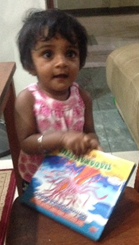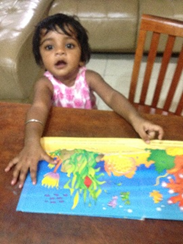Introduction
Every parent waits excitedly to hear their child’s first word. They wait anxiously to hear them use sentences. They enjoy conversations when their children can talk smoothly and discuss various topics together. Yes, learning to talk is indeed one of the most exciting and important stages of a child’s language development.
Most of us are aware that language development refers to how and when a child learns to talk. We know that language development is important for children to communicate with others, to express their needs, and to share daily experiences. What we often don’t realize is that language development is an integral part of learning to read and write as well.
Children who have good language development tend to have good reading and writing skills and do well in school later on. Sadly, the opposite is also true; children who have poor language development enter school without the much needed foundation for literacy, and find it difficult to improve much throughout their school life.
How well a child does in school depends to a large extent to his language development and early literacy skills. Children with excellent language development go on to develop crucial early literacy skills which eventually leads to the much needed reading and writing skills. Early literacy skills are an important indicator of how far a child will go in terms of reading and writing success.
Early Literacy Skills
So what are early literacy skills? It is not yet reading and writing, but what a child knows about reading and writing BEFORE they actually learn to read and write.
Various publications suggest a wide variety of early literacy skills that a child should know before they start to learn reading or writing. These skills may not be what we expect, as they are not necessarily reading or writing skills but rather more on general language skills. Some of these skills may not be obviously related to reading and writing, but are nevertheless really important foundation skills upon which reading & writing can built.
Among the important early literacy skills are conversation, vocabulary, story comprehension, print knowledge, sound awareness, listening skills, talking, and an interest in reading and writing material.
Why is language development so important to reading and writing? As we have seen, the foundation that reading and writing skills are built on are mostly language skills. Early literacy skills are basically a sound foundation in language understanding, speech, and speech sounds. We will look a few of these early literacy skills and how language development in these areas affect reading and writing development.
Early Literacy Skill 1: Interest in Books & Literacy
Think about what you like to do, what you are interested in. Now think about what you are good at, what are the skills that you can do well? Most likely we will all come up with same items in both areas. The things that we enjoy doing is likely to be the things that we are good at. Have you seen a famous chef who doesn’t like to cook? Of course not, he is a world class chef because of his great interest in cooking. Same goes for learning to read and write.
An important indicator of how fast and how well children learn to read and write is how much interest they have in all things related to reading in writing. Children who are surrounded by books and prints and writing material like colours and crayons are primed for reading success, especially when a loving parent gently yet enthusiastically guides them in exploring all these literacy material.
A critical early language stimulation activity is book sharing, or reading to your child. Children who are exposed to books and are read to will pick up language understanding, develop their vocabulary, learn to make sentences, learn to retell a story, and most importantly develop a love and interest for books. This is crucial as only when they love books will they want to learn to read and write. So bear in mind that one of the most important early literacy skill is an interest in books, and start reading to your little ones!
Early Literacy Skill 2: Phonological Awareness
Have you heard a drum beat? Could you count the beats? Now think of a long word, like ‘caterpillar’. Can you count the number of beats, called syllables, in the word? Let’s try – ‘ca-ter-pi-lar’, so that’s 4 syllables. This is part of phonological awareness, together with the ability to rhyme, and other skills related to knowing about the sounds in our words.
Phonological awareness is an important early literacy skill. Among the signs that a child has good phonological awareness is being able to rhyme, finding other words with the same sound, knowing that a sentence is made up of words, and a word is made up of smaller sounds. Children who are introduced to this concept early are able to sound out words they hear, like ‘cat’ can be sounded out to be ‘c-a-t’. When they transition to learning to read, this skills will come in very handy as reading is basically sounding out the words.
Learning all about speech sounds, or having good phonological awareness is a fundamental speech and language skill. Children who have good language stimulation and exposed to the concept of speech sounds through listening and speaking will develop the skills they need to make sense of sounds when they learn to read to write. So think about sounds in a word and be mindful to highlight it to young children as phonological awareness paves the way to reading and writing.
Early Literacy Skill 3: Language Comprehension Skills
We all have come across that student who doesn’t follow instructions. We sometimes laugh when we ask for a spoon but our child brings us a fork. This could be signs that the child has a language comprehension difficulty. Children with good language understanding will be able to identify items and follow instructions, according to their age level. Language understanding is important not just in speech and understanding what is said, but also a critical early literacy skill.
Reading involves not just sounding out the words but also understanding what is read. This is where comprehension skills come in. Language comprehension means being able to understand what a word or sentence means. At later stages it means being able to understand a story, and even being able to understand why and how certain things happen in a story.
Once again, children who have a strong foundation in language, in this case language comprehension, will be better able to pick up reading and writing skills, be able to understand what they read better, and also make deductions and conclusions about what they read. Before reading and writing, children need lots of exposure and practice with speech and language. Children who enjoy daily interactions where they learn to understand the world around them will eventually have the skills, knowledge and experience to figure the world in books and other printed material. Children who have trouble understanding what is said to them will also face challenges in comprehending what they read.
Always remember to show and explain things to young children, to build on their understanding, as this will go a long way in their communication and also their reading and writing.
Early Literacy Skill 4: Vocabulary
Do you have trouble finding the right words to say? Isn’t it frustrating when you want to express yourself or describe something but just can’t seem to find the words to say? On the flip side, isn’t it amazing when you hear the right words? Isn’t it a joy to hear the lovely lyrics of a well written song? Isnt it invigorating to listen to a good speaker at a seminar or have a conversation with someone who has a way with words? The number of words we know & use can certainly take us places, and is an important skill to have, both for speech and language development and also reading & writing.
Words words words… we grow up with words all around us. Children who grow up with words at home will have the opportunity to learn and understand many new words. They pick up new words every day. The number of words we know is called our vocabulary. Children who have a large vocabulary are at an advantage as they will be able to express themselves better and enjoy more conversations.
The benefit of a large vocabulary goes beyond just speech & language. Children with a considerable vocabulary are better able to learn to read and recognize new words when in a book. A good foundation in speech and language skills, one of which is a large vocabulary, will help children to be ready to learn to read. Once again, having excellent language skills, this time having a large vocabulary, will be an advantage for children when they learn to read and write.
Early Literacy Skill 5: Clear Speech
Not only is knowing many words important to learning to read & write, but how clear or how intelligible a child’s speech is also important. How clear a child’s speech is depends on many factors, one of them being their own speech sound system. Children who have difficulty saying certain sounds might experience difficulty reading as well.
If a child speaks well and clearly, then they are able to say these sounds better, which apparently leads to being able to sound it out better and read it better.
Research has shown that for many children, even a few speech sound errors, (not able to say some sounds clearly) may result in difficulty learning to read and write. Some experts have found that if children are not speaking clearly enough by 5 1/2 years old, they tend to have trouble picking up literacy skills as well.
It’s important to model good speech and language skills. Speak clearly and articulate sounds well. If a young child is not intelligible, it is wise to get a speech and language assessment by a qualified speech language therapist. Speech sound disorders can be treated, and this will help children to speak better as well as have a better concept of sounds that will help them to read better.
Conclusion
We have seen how being interested in books, phonological awareness, understanding language, having a substantial vocabulary, and being able to speak clearly all play a pivotal role in helping children to have a sound foundation in early literacy skills. Language development is important for children to communicate and also to have the needed skills to prepare them to be ready to learn to read & write. Simply put, good language skills are needed as they are more than just communication skills but also double up as early literacy skills. Our role as parents, teachers and responsible adults is to encourage, model and stimulate good speech & language skills to give children strong communication skills & early literacy skills.
References
- Bowen, C. (2011, November). Literacy and Children with Speech Sound Disorders. Retrieved 30/8/2015 from http://speech-language-therapy.com/index.php?option=com_content&view=article&id=73:literacy&catid=11:admin&Itemid=108
- Concurrent Validity and Diagnostic Accuracy of theDynamic Indicators of Basic Early Literacy Skills and the Comprehensive Test of Phonological Processing. John M. Hintze, Amanda L. Ryan, Gary Stoner. School Psychology Review 2003.
- Emergent Literacy: Early Reading and Writing Development. Froma P. Roth, Diane R. Paul, Ann-Mari Pierotti American Speech-Language-Hearing Association (ASHA), 2006 http://www.asha.org/public/speech/emergent-literacy/ Retrieved on 20/8/2015
- Greenberg, J. & Weitzman, E. I’m Ready! How to Prepare Your Child for Reading Success. Toronto: Hanen Early Language Program.
- Weitzman, E. & Greenberg, J. ABC & Beyond: Building Emergent Literacy in Early Childhood Settings. Toronto: Hanen Early Language Program
| Last Reviewed | : | 28 August 2020 |
| Writer / Translator | : | Amelia Inbam Neelagandan |
| Accreditor | : | Wahida bt. Mohd Abd Wahab |
| Reviewer | : | Nadwah bt. Onwi |









